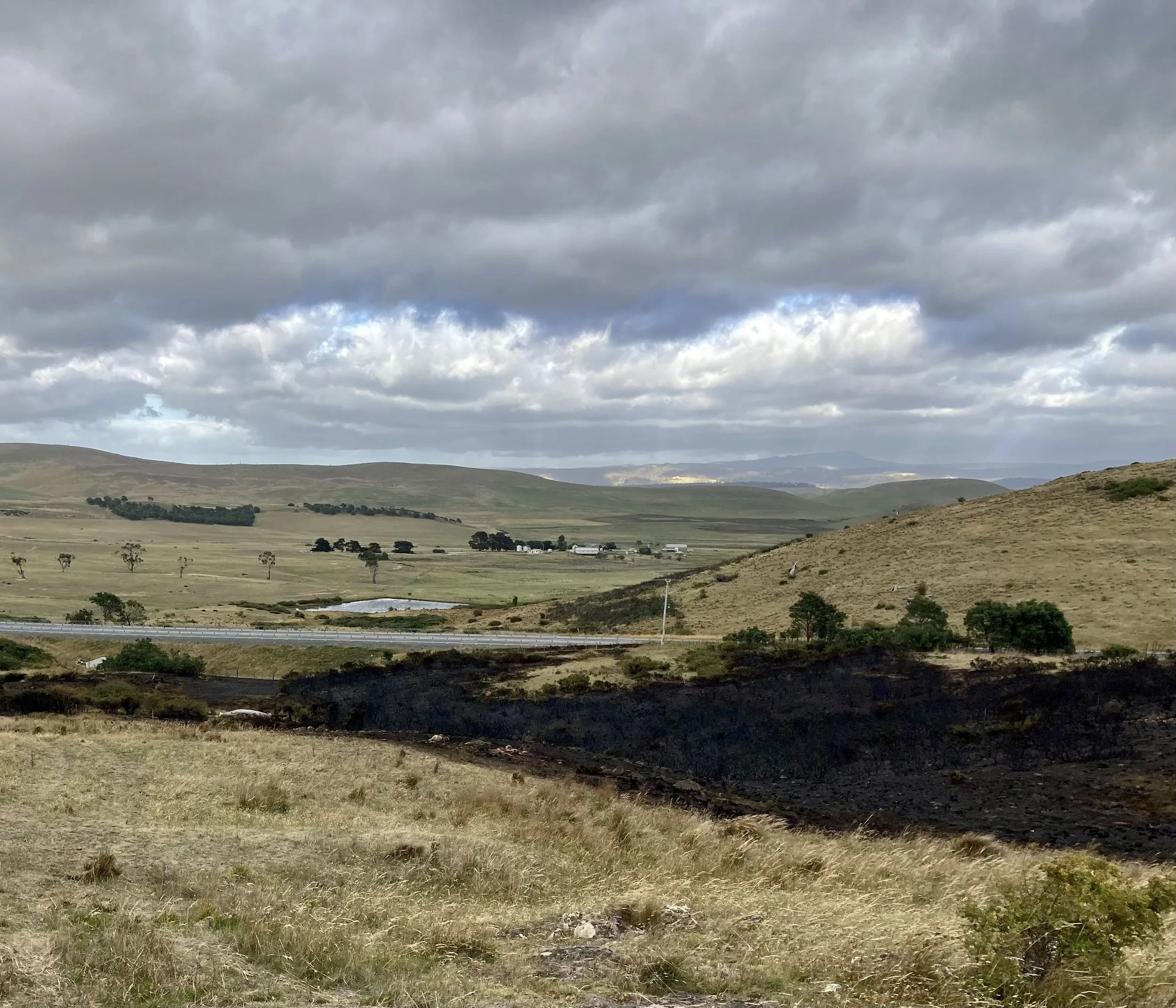Thank goodness for the fireys!
For the third time in seven years I have reason to be grateful to our local volunteer fire brigades. My farm borders the Midland Highway for several kilometres south of Oatlands, on the downwind side of westerly winds, leaving me vulnerable to fires starting from a careless cigarette, or in this case, apparently a fault in the power line running alongside the highway. The third fire was started by lightning, back in 2019.
In each case, the fireys were there within an incredibly short time, having organised helicopters or fixed wing planes to water bomb while the fire trucks were on their way. The most recent fire started on a day with severe weather warnings for damaging winds—westerly at 55 kph, gusting higher.
The tree reserve in 2020, age 8.
The fire moved rapidly through a dense stand of gorse (one I’d never had the courage to burn) and roared up a hillside on which an 11-year-old native tree reserve had been flourishing. Topping out, the wind sent sparks into an area with widely spaced remnant mature white gums, setting half a dozen of them alight. From there, the fire jumped again to two other mature cabbage gums a couple hundred metres away. Interestingly, the grass in between did not catch, even though last year’s seed heads and dry stalks were still there, over top of the new season’s green growth.
From the cabbage gums, it was a straight-arrow shot downwind through long grass to my house, about 500 m away. Happily, my sheep were safe and sound in a paddock well upwind of the fire’s path.
The power pole that looks like the source of the fire.
When the fire started, I was at the vet in Brighton, about 40 minutes away, and voicemails and text messages started flooding in from friends and neighbours, saying they were on their way, and would check my sheep and keep an eye on my house as I drove somewhat over the speed limit on my way home. Such a helpless feeling, knowing how fast a grass fire travels, and not knowing at the time where my sheep were relative to the fire!
One of the water-bombing helicopters
But thank goodness for the fireys. They were on the job and got the fire contained in the time it took me to drive from Brighton. I watched the helicopters criss-crossing the highway to pick up water as I drove up the highway.
Because the old white gums were well and truly alight, we didn’t have much choice but to let them burn out overnight. The fireys tried to burn the grass as a safety around the old trees, but couldn’t get it to light. So I took it in turns with the fireys to patrol until about midnight, so they could catch a break. When they returned, the big trees were still burning merrily in the strong, gusty wind, sending out showers of sparks, but no grass had caught alight. At midnight the fire crew and I agreed it was safe for us all to go and get some rest.
The scene at midnight.
First thing the following morning, they were back on the job, checking the old trees, which had mostly burned down, and then dousing the last smouldering heaps with enough water to put them out completely.
Old white gum stump still burning the following morning—note the unburnt long grass!
Water to fight the fire came from my neighbours at Lemon Springs (thank you!) from my own dam, troughs and header tank. The fire cut power to parts of Oatlands, including my farm, so my main stock water pump was not working during the fire or overnight. My header tank is an old plastic household tank, re-purposed for my stock water system. It doesn’t have the quick-access fitting now required on water tanks installed at homes, slowing the fireys down when they went to use it.
Lessons for me from this latest fire:
Be prepared. A dangerous fire can start in any conditions. I did have my own firefighting unit serviced recently, and it was ready to go. However, my header tank was not topped up, as it should have been, especially given the likelihood of a power failure.
Let someone know if you’re going to be away with no-one at home—tell them where your animals are and if there are any special things they should know about them.
Make access to water supplies as easy as possible. I’m thinking seriously of a second header tank—metal—with the requisite quick-access fitting—placed next to my plastic tank.
Think about becoming a volunteer with the fireys. Even if you’re past your active firefighting days, as I probably am, there are lots of other jobs to be done.
I found most heartwarming the support I received from my friends and from the fireys, many of whom I know personally. The experience feels like community supporting community in the best sort of way. The fireys were so careful and conscientious, coming back a couple of times during the evening, and making sure I felt comfortable with nighttime patrolling and with the decision to leave the big old white gums to go out in a blaze of glory.





